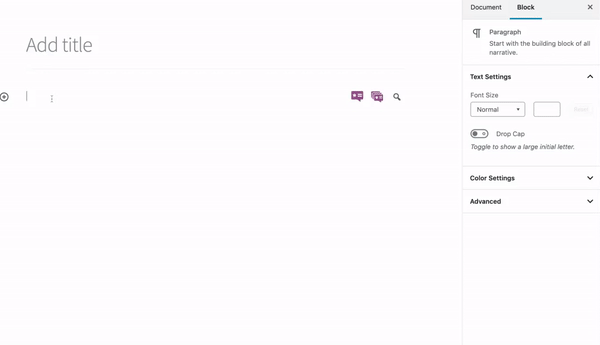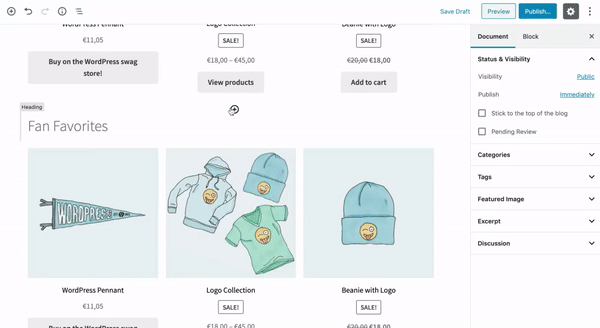WooCommerce 3.8 delivers new WooCommerce Product Blocks and a few enhancements for all store owners, plus new hooks and tweaks for developers. We’ll break it down for you below.
What’s new in 3.8
↑ Back to topWooCommerce 3.8 is likely our last minor release of 2019 and should be fully backward compatible with all WooCommerce releases since 3.0.
As always, we highly recommend following best practices and making a backup of your site before updating WooCommerce. More at: How to Update WooCommerce.
WooCommerce Blocks 2.4
WooCommerce Product Blocks, our eCommerce-focused collection for the Gutenberg Block Editor, allow you to easily showcase products on your site.
WooCommerce Blocks 2.4 brings some powerful new blocks to the collection.
Reviews Blocks
There are three new blocks for Reviews:
- Reviews by Product
- Reviews by Category
- All Reviews
All allow you to customize how, what, and where to display reviews. Share social proof about your products by placing All Reviews on the landing page, drop Reviews by Product on the product page, and use Reviews by Category to show how previous customers loved hand-knit socks to visitors looking for winter wear.
Product Search
Give customers the power to find the products they’re looking for from any page on your site with the new Product Search block.
More about these new WooCommerce Product Blocks in the Release Notes.
To access and use WooCommerce blocks, you need to be running WordPress 5.1+ on your site or have the latest version of the Gutenberg plugin installed.
Upcoming Performance Improvements
↑ Back to topThere is no change in the PHP and WordPress requirements for this version. However, sites not currently running on PHP 7.0 and WordPress 5.0 will see a notification to upgrade in preparation for the next release expected on January 7, 2020. Why?
In WooCommerce 3.9, we plan to update the minimum version of PHP to 7.0 (now 5.6.20) and WordPress to 5.0 (now 4.9) to keep up with changes in the WordPress and PHP ecosystem.
Get your store ready with advice from Update PHP and WordPress.
Enhancements
A few improvements in this release are:
- “Available on backorder” messaging for products available on backorder
- Opt-out of usage tracking by default in the Setup Wizard
- Better wording for subtotal and downloads
- Full support for PHP 7.4
For developers, WooCommerce 3.8 includes:
- A new template –
content-widget-price-filter.php– for displaying a product price filter widget. Previously this was embedded in a core file. - Several new hooks and filters
- Localization tweaks for Japan, Namibia, Zambia, and US Minor Outlying Islands
All dev fixes and tweaks are detailed in the Changelog. And more technical notes can be found on the WooCommerce Developer blog.
Are you ready?
We’re here if you need us, but please be aware that we’re unable to diagnose or solve potential issues via blog comments. The best and fastest way to get in touch is by using the methods listed.
- Found a bug or conflict? Report it via our GitHub issue tracker.
- Need help with the upgrade? Visit our Support page.
- Want to discuss the release, or have a great idea for the next version? Start a discussion on the public WooCommerce forum at WordPress.org.
Let us know what you think of WooCommerce 3.8 below!
About





I like WooCommerce more than expensive Shopify. Especially, if you provide content marketing with WordPress because you can create high-quality informational and e-commerce content. Thanks, Brent for sharing it.
Did you fix the accessibility issues? The last version of Woo Commerce failed quite a few tests for ADA compliance / WCAG 2.0 AA.
Thank you,
Nate
Oh crap, I didn’t realize this was going to be a public comment. I thought it was a form to ask questions and maybe a sales rep would get back to me or something.
And still you didn’t had time to add product list view beside default grid view which would be much more useful than this review crap.
Hey mate they are doing what ever they think is better and the demand is higher for. Don’t need to use such language…
regards
Is there any chance that woocommerce will have the functionality of having separate categories for variations of a variable product? In other words a single variation can be in a category that the other variations are not in.
News
See allStripe’s Agentic Commerce Suite launching with WooCommerce support from day one
By Jay Walsh •
WooCommerce integration with Mastercard accelerates digital acceptance for EMEA ecommerce merchants
By Jay Walsh •
Reddit for WooCommerce: Bringing high-intent shoppers to your store
By Jay Walsh •
Never miss a beat — join our mailing list
Please enter a valid email.
View our privacy policy. You can unsubscribe anytime.
There was an error subscribing; please try again later.
Thanks for subscribing!
Emails will be sent to
You're already subscribed!
Emails are sent to